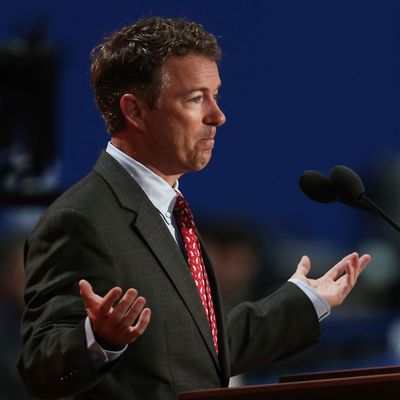
Did you know the Republican Party harbored deep civil libertarian objections to the use of drone strikes against Al Qaeda? I didn’t know that. I don’t think anybody knew that until Rand Paul launched a surprise talking filibuster Tuesday night and his position, over the course of a few hours, went from marginal within the party to something like an official Republican position, with colleagues marching before the cameras to support him, Republican National Committee chairman Reince Priebus calling his filibuster “completely awesome,” and the National Republican Senatorial Committee demanding support for Rand. Paul is now announcing — or, more accurately, reminding people — that he may run for president in 2016, the prospects for which have been elevated from “sideshow kook” to “dark horse.”
Among those bewildered is John McCain, who calls Paul and Ted Cruz “whacko birds.” While this is a typically cranky and ungenerous response to the specific issue at hand — Paul’s laudable desire for assurances about the limits of drone warfare — it is also, broadly speaking, correct. What’s interesting is that not only the official but the unofficial organs of the party — Matt Drudge, Breitbart, Rush Limbaugh — have all sided with Paul. The whacko birds suddenly find themselves on the inside, while the party’s 2008 standard-bearer presses his nose against the glass and gawks.
Paul’s sudden ascent represents the convergence of two broad currents of Republican thought. The first is the rise of Ayn Rand–ism, which has become the party’s main ideological response to the Obama years. Randism is an apocalyptic mind-set that conceives of politics as a struggle between makers and takers. Not just Paul himself, but such diverse figures as CNBC shouting head and tea-party father Rick Santelli, Paul Ryan, AEI President Arthur Brooks, and Cruz — who quoted Ayn Rand while enthusiastically leaping to Paul’s defense — have all claimed the deep influence of Rand.
It may seem more surprising that a party that veered so far right on foreign policy under George W. Bush might rally around a figure like Paul. Doesn’t anybody remember Ron Paul consistently drawing mockery from fellow presidential candidates and boos from audiences for his isolationist homilies? Why did Republicans suddenly stop hating this stuff?
One reason is that Paul himself was never exactly libertarian. He opposed the construction of a Muslim cultural center in lower Manhattan, opposed Obama’s attempts to close down the prison at Guantánamo Bay (“These thugs should stand before military tribunals and be kept off American soil”), and even endorsed imprisoning people who attend radical Islamist speeches. What he represents is a particular paleoconservative fear of government being turned against them. Where he has been most at odds with the party base is Israel, and here he has shrewdly and unashamedly remade his position to become acceptable to the base.
Another reason Paul has succeeded is that Republican hawkery was never quite as intellectually coherent as the neoconservatives liked to believe. As Ross Douthat astutely observes, “What Paul seems to understand is that the Republican base doesn’t really have a detailed set of foreign policy positions: What it has, instead, is the cluster of sympathies and instincts (pro-Israel, pro-military, nationalist rather than globalist, fretful about radical Islam, skeptical of international institutions).”
Partisanship has played a huge role here. To be fair, both bases tend to trust their own president to wage war more than the other party’s. Republican noninterventionism spiked under Bill Clinton, essentially disappeared under Bush, and has reemerged under Obama. Note that the particulars of Paul’s foreign policy stances position himself against Obama in every case — where Obama has gone left, like on Guantánamo, Paul goes right, and where Obama goes right, like on drones, Paul goes left. His drone filibuster won attaboys from hawkish Republicans like Charles Krauthammer and Seth Lipsky, both of whom confess a queasiness about the content of Paul’s argument but simply enjoy his role as administration antagonist.
But Paul is almost certainly not going to be elected president, and his foreign policy skepticism will remain cool with his party only as long as the GOP remains out of the White House. But that will be the case for at least another four years. In the meantime, Paul is making the most of his moment.






























